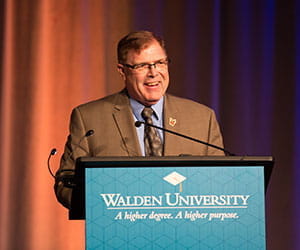
When he began his doctoral research in May 2014, Dr. Donald Schlomer ’17 had no idea the future influence he might have.
Then, in October 2016, the U.S. Army announced the formation of the Army Futures Command, a cross-functional task force that looks at modernizing all aspects of military equipment. Schlomer’s doctoral research was a study on how to more efficiently acquire the future. It was a perfect match.
“I went to my Doctor of Business Administration (DBA) program chair, Dr. Douglas Campbell, and he said, ‘Do you realize with this announcement that your research is bigger than us, bigger than Walden?’” Schlomer recalls. “He said, ‘It affects the Army, the entire military, and the safety of everyone in the country.’ That’s when it became clear to me that this could have a real impact.”
Schlomer is the first to research and write a doctoral study on improving the Army’s Joint Capabilities Integration and Development System (JCIDS), the process used to identify and purchase equipment and weapons needed to keep the military running and relevant. His research focused on the inefficiencies and delays caused by the approval processes.
As an Army officer and acquisition specialist, Schlomer spent 13 years of his 30-year military career working with the JCIDS. What he learned was that the same approval process was being used to purchase a jet or tank as it was for a pair of boots, and all purchases required review by the chief of staff of the Army.
According to Schlomer, there are only about 80 military programs at the jet or tank level but thousands at the boots and backpacks level that could be approved locally.
“Technology advances every 14 to 18 months, but the current process takes 72 to 90 months,” he says. “That effectively leaves our military personnel inadequately equipped.”
Retired from the Army Reserve since 2008, Schlomer now works for Special Operations Command in Tampa, Florida. He enrolled in Walden’s DBA program, in part, for the possibility of increasing credibility.
“I wanted to do the research on streamlining acquisitions for years,” he says. “But I didn’t think leaders would listen to a retired guy. If I did it as part of a doctoral program, I thought the Army might pay attention.”
He was right. His research has been widely recognized and has gotten him a literal seat at the table. In addition to receiving Walden’s 2018 Frank Dilley Award for Outstanding Doctoral Study, Schlomer has discussed his research recommendations with top brass, from generals to the secretary of the Army.He has twice shared his insights with former National Security Advisor Lt. Gen. H. R. McMaster.
Schlomer has also been handpicked as the only nonmilitary, nongovernment civilian member of the Army Futures Command task force, the group setting up the new Army modernization function. The task force began setting up in July and will be fully functional in October 2020.
Schlomer plans to leverage his doctoral research to help write processes and regulations for the Army Futures Command. Once the task force’s work is fully implemented in 2020, he plans to retire and then move on to teaching.
“The truth is, none of this would have happened if I had not had the opportunity to do my doctoral work with Walden,” he says. “It’s been humbling, especially when you realize the potential impact the work can have. If we speed up modernization and our military capabilities and do it more efficiently, the military benefits, civilians are safer, and it saves significantly on costs. Everybody wins.”
— Kevin C. Thornton



